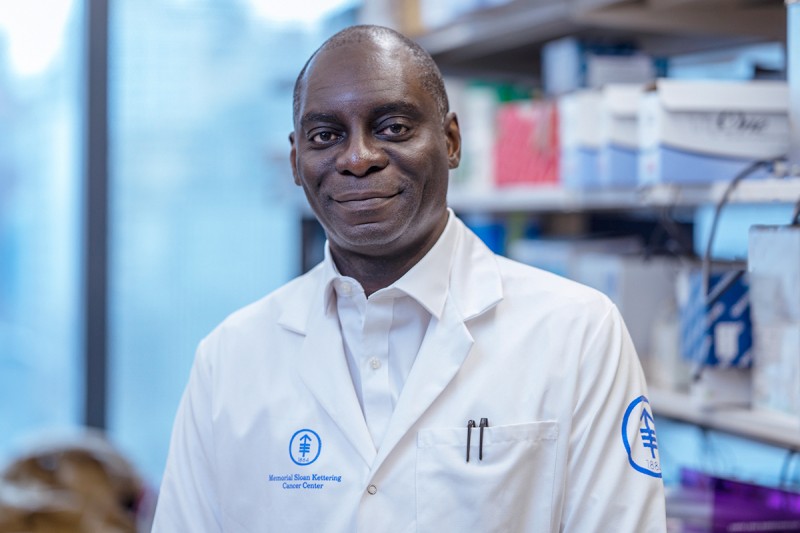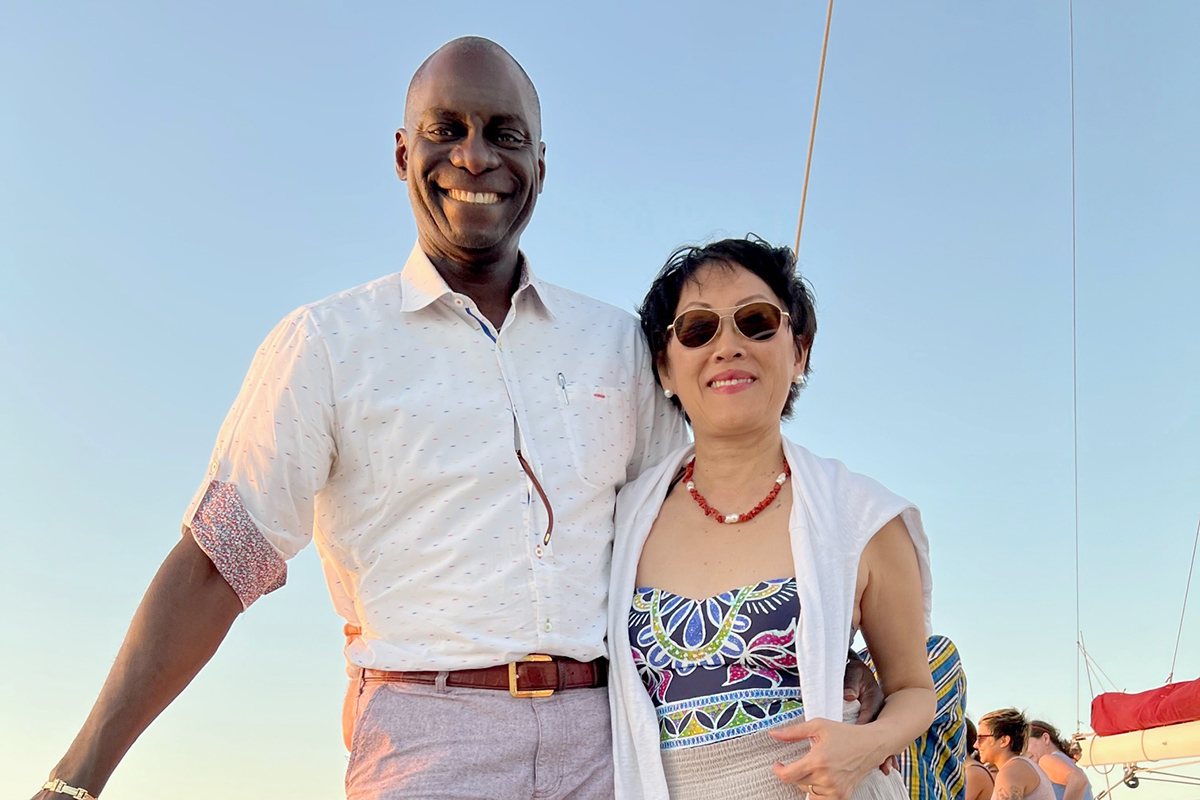
Dr. Kojo Elenitoba-Johnson recently joined MSK as the inaugural Chair of the MSK Department of Pathology and Laboratory Medicine and is a member in the Human Oncology and Pathogenesis Program. He leads teams of MSK experts in interpreting lab tests and diagnosing cancer.
The connection might not be clear at first glance between tennis, Ping-Pong, and pathology, which is the science of diagnosing disease.
But Kojo Elenitoba-Johnson, MD, a pathologist at Memorial Sloan Kettering Cancer Center (MSK), says, “The principles of the racket sports I like to play are very instructive.”
He continues: “If you want to hit the ball in the sweet spot, you better be in the right position. And to do that requires hard work and preparation.”
Dr. Elenitoba-Johnson says he looks for lessons he can apply to medicine from all aspects of life, whether he’s reading history or enjoying jazz. And his illustrious career has proven to be a case study in hard work and discovering insights that have pushed the frontiers of pathology.
How Does That Work?
As a child growing up in Lagos, Nigeria, Dr. Elenitoba-Johnson was “always curious about how things work,” he says. “I loved science and math because of how well they explain the whole universe.”
During his high school years, he says, “I grew to understand that the highest manifestation of this, in my opinion, is biology — particularly human biology.”
His desire to understand how the human body works led him to medical school at home in Nigeria. There, Dr. Elenitoba-Johnson recalls, “The instruction was excellent, and I had several influential professors.” He discovered a new focus for his fascination with how things work — diagnosing disease and the science of pathology.
“In my second year,” he says, “I was compelled by the idea that medicine is divided into two areas. The first is coming up with an accurate diagnosis of what actually is going on. The second is intervening to try to help.”
He explains, “I found this first area particularly intriguing because without the right diagnosis, you are left with speculation, hand-wringing, and poor care — particularly with cancer, which is an area where I hoped to contribute to research.”
After graduating, he came to the U.S. as a pathology resident at Brown University. “At that time, we were experiencing a global revolution in pathology, centered on the immune system as well as the birth of molecular pathology. For the first time, we were able to use molecular techniques to better understand what kind of cells tumors arose from with great specificity.”
He continues: “At the same time, the idea that cancer was a genetic disorder was becoming mature. More and more mutations were being identified, and their roles were beginning to be recognized. We had new tools and insights that went beyond microscopic evaluation of tumors, which is what pathologists did traditionally.”
Dr. Elenitoba-Johnson felt these new insights were most optimally integrated in the field of hematopathology, which studies blood disorders. Throughout his career, lymphoma has been an area of particular expertise.
One of the First Experts in His Field
Dr. Elenitoba-Johnson was exhilarated by these new windows into cancer. In fact, during his training, the specialty of molecular pathology was so young that he was one of the first people to be credentialed in the field by the American Board of Pathology.
As his career progressed, he made major contributions to pathology while holding leadership positions at premier institutions of biomedical research, including the University of Utah, the University of Michigan, and the University of Pennsylvania.
He calls the opportunity to help lead pathology efforts at MSK the “privilege of a lifetime.”
“What is particularly appealing at MSK,” he explains, “is that MSK is the world leader in so many areas, especially in the clinical aspect of pathology. And it is the top destination for the most sophisticated training.”
For people facing cancer, Dr. Elenitoba-Johnson says that means he will continue MSK’s “enduring tradition of leading practice in my field in a way that impacts patient care.”

(From left) Dr. Elenitoba-Johnson and his wife, Dr. Megan So-Young Lim, in Costa Rica
A Shared Commitment
Dr. Elenitoba-Johnson’s commitment to advancing the diagnosis of cancer is shared by his wife and fellow molecular hematopathologist, Dr. Megan So-Young Lim, MD, PhD. The two met when they were fellows at the prestigious National Institutes of Health (NIH), and their careers have been entwined ever since.
Dr. Lim is an accomplished physician-scientist and investigator whose independent research program is supported with funding from the NIH. Drs. Lim and Elenitoba-Johnson were co-recruited to MSK. Given that they both conduct research on lymphoma, they are able to leverage synergies in expertise and creativity.
“She’s an exceptional pathologist and scientist,” Dr. Elenitoba-Johnson says. “We have complementary ways of solving problems, which adds to the quality of the work we’re able to deliver together.”
Dr. Elenitoba-Johnson says they also make a good duo in the kitchen. “I like to discover cultures through food — in truth, I really like to eat,” he says with a laugh. “She’s of Korean descent and I’m from Nigeria. Over time, we’ve learned to blend the two cuisines. We tell people, ‘You’ll have to go far to try another Korean-Nigerian meal.’ ”
Among those who have enjoyed their creations is MSK President and CEO Selwyn M. Vickers, MD, FACS, who says Dr. Elenitoba-Johnson is an excellent cook. “Dr. Vickers came to our apartment for dinner and took the risk,” says Dr. Elenitoba-Johnson humbly.
Making unexpected connections between disparate things is just one of the reasons that Dr. Elenitoba-Johnson describes himself as a perpetual learner. He views curiosity as a lifelong pursuit — much like racket sports — and says he is tailor-made for the study of pathology.
“It turns out, the more we know, the more there is to discover. It’s endlessly fascinating.”
Dr. Elenitoba-Johnson and the Human Oncology and Pathogenesis Program have received additional support from Cycle for Survival® and other MSK donors.
Dr. Elenitoba-Johnson holds the James Ewing Alumni Chair in Pathology.
